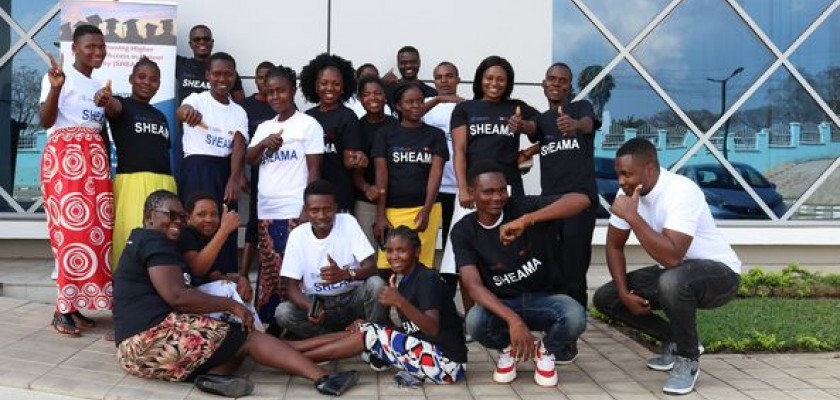Call for Applications - MUST ODeL Short Courses (Re-advertised)
05 March, 2021 by HEC Media in

With support from the USAID funded Strengthening Higher Education Access in Malawi Activity (SHEAMA), led by Arizona State University (ASU), MUST is inviting applications from suitably qualified persons to pursue the following short courses through ODeL.
Business Management and Entrepreneurship
This programme targets individuals aspiring to become successful entrepreneurs, business owners, trainers in entrepreneurship and business development, and community development officers. Women and youths in small and medium scale business are encouraged to apply. Indicative Content: Introduction to business and entrepreneurship, business environment analysis, marketing plan development, human resource planning and organization, financial planning and writing a winning business plan.
Course duration: 6 weeks (fully online)
Fees for Business Management and Entrepreneurship Candidates will pay K200,000.00. An initial part payment is required before registration with the remainder to be paid a month after commencement of classes.
Fundamentals of Geographic Information Systems
This course is designed to introduce GIS basics, mapping and spatial analysis tools which can be used to solve different spatial problems in order to enhance decision making and improve communication.
Indicative content: Introduction to GIS and GIScience, Introduction to QGIS software; Spatial data models; Cordinate system and map projections; GIS data sources; Spatial databases; Spatial data analysis using QGIS; Automating workflows in QGIS; Cartography and geovisualisation; and web mapping.
Target Participants: Data managers, statisticians, academicians, researchers, cartographers, project managers, executive managers and technical staff involved in disaster risk management, conservation managers, health specialists, social scientists, monitoring and evaluation experts, WASH specialists, hydrologists, GIS professionals, professionals working in utility institutions, town planners, environmentalists, college students and anybody who works with spatial data.
GIS and Remote Sensing for Natural Resources Management
This course focuses on introducing GIS and Remote Sensing for natural resource management; valuable tools in natural resource management, and monitoring.
Indicative content: Basic GIS and Remote Sensing concepts and terminologies in the context of natural resource management; GIS and Remote Sensing data acquisition for natural resource management; Remote sensing image processing and interpretation; hydrological data analysis in GIS using QGIS; Land use and land cover mapping and change detection using QGIS, processing vegetation indices; forest mapping and vegetation monitoring; cartography and geo-visualisation.
Target Participants: Conservation managers, forestry officers, biologists, hydrologists, geologists, environmentalists, researchers, executive managers and technical staff involved in disaster risk management, project managers, academicians, professionals working in utility institutions, town planners, professionals working in disaster risk management, monitoring and evaluation experts, college students and those who work/will work with remote sensing and GIS data.
Geospatial Database Management
This introductory-level course is intended to present fundamentals of geospatial database design, implementation, management, and access. It is intended for participants who want to learn how to create, maintain, and retrieve data from a spatially enabled database. It is a course for anyone who is interested in organizing spatial and non-spatial data in geospatially enabled Database Management Systems (DBMS).
Indicative content: Geo-database Design Strategies, Database Types, Managing Data in Tables (RDBMS), Spatial Data Modeling and Spatial Data Models, Entity- Relationship (E-R) Models, Normalization, Data Dictionary, Data Standards, Coordinate Reference Systems, Spatial Metadata, Structured Query Language (SQL), Spatial Join, Topology, PostGIS and QGIS, Postgres/PostGIS Topics: Management Functions, Geometry, Spatial Functions and Geo-database design project.
Target Participants: GIS experts, cartographers, data scientists, statisticians, computer scientist, conservation managers, forestry officers, environmentalists, researchers, executive managers and technical staff involved in disaster risk management, project managers, academicians, professionals working in utility institutions, town planners, professionals working in disaster risk management, monitoring and evaluation experts, college students and those who work with spatial data.
GIS and Remote Sensing for Disaster Risk Management
This course will introduce the basic concepts of GIS, Remote Sensing and disaster risk management and impart practical skills on how to utilize GIS and Remote Sensing during pre- and post-disaster management such as early warning systems, hazard mapping and damage assessments.
Indicative content: Basic concepts of GIS, Remote Sensing and disaster risk management; spatial data sources for disaster risk management; Spatial data
collection using Global Positioning System (GPS); Creating field data collection apps for disaster risk management studies; Introduction to QGIS; Hazard, vulnerability and risk assessment with GIS and Remote Sensing; Application of risk information for risk reduction and planning; use of satellite imagery in post-disaster impact and damage assessment; flood mapping with satellite imagery using ESA SNAP Toolset; Cartography and geovisualisation; sharing DRM information through web maps.
Target Participants: The course is open to all professionals in the field of disaster risk management who require knowledge and skills on the use GIS and Remote Sensing in their organisations. Participants are welcome from a broad range of organisations and individuals including physical planning professionals, GIS experts, college students and those who work / will work with GIS data and Remote Sensing data.
Course duration for courses 2, 3, 4 and 5: Each course will run for 3 weeks (online sessions) and 3 days face to face (practical sessions).
Fees for courses 2, 3, 4 and 5: Candidates will pay K150,000.00. An initial part payment is required before registration with the remainder to be paid a month after commencement of classes.
SHEAMA Scholarship Opportunity
There are few scholarship spaces available to candidates who obtained their MSCE qualifications through Community Day Secondary Schools (CDSS) and Open Secondary Schools (Night Schools). Those from SHEAMA target rural districts of Karonga, Kasungu, Salima, Balaka, Mulanje and Chikwawa, especially adolescent girls, young women and persons with disabilities, are particularly encouraged to apply. SHEAMA scholarships will be made available to a few candidates that will meet the program set criteria. For those who meet the scholarship requirements, please contact the ODeL Coordinator at MUST, through [email protected] and 0999304336 or the Director of Scholarships and Grants at SHEAMA, through smkwetez@ asu.edu or 0991784775; or [email protected] or 0999029849.
Organizations intending to sponsor a group of participants may also contact us for more details and special arrangements.
Mode of Application
Request for application forms from the address or email below.
Send filled application forms together with other relevant documents to the same address, on and before 20th March 2021. If you previously responded to this announcement, you do not need to re-apply. All previous applications are well filed.
The Director of Research, Postgraduate Studies and Outreach,
Malawi University of Science and Technology,
P.O. Box 5196, Limbe. Email: [email protected]
Download forms below:
